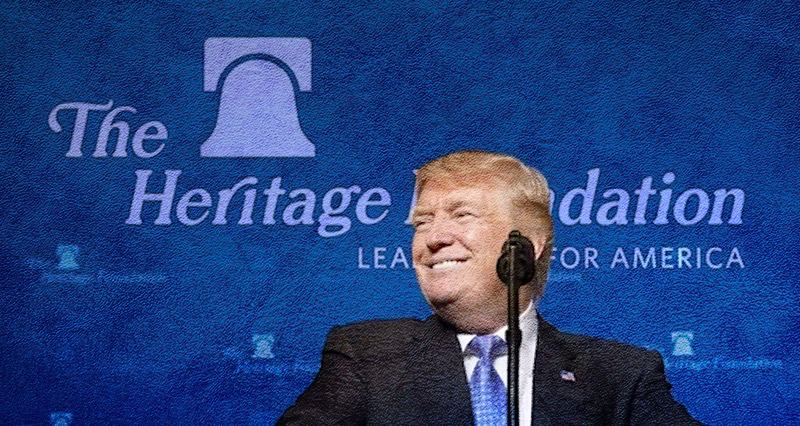Anti-Trump protests after his election took place in front of her, an indication of the influence of the Heritage Foundation, a conservative tink tank founded in 1973. Since 1981 it has published the Mandate to Leadership, a programmatic text for the president-elect. In 2023, it released its latest nearly 900-page report for Donald Trump.
As such, the foundation is “just” a think tank, an institution designed and financed to influence politics. Democrats attacked the institution as being the mastermind behind Trump’s campaign and politics. Trump denied that. But a short glance indicates the foundation is quite successful to connecting politics. Vice-President J. D. Vance wrote a foreword to the book “Dawn’s Early Light” by Kevin Roberts, the Foundation’s president.
Together with no less then 100 other conservative organizations, the foundation started the Project 2025, a “Presidential Transition Project”, “to take down the Deep State and return the government to the people”, as it describes itself. Again, it claims to be independent from Trump.
But it strikes attention that the “Mandate for Leadership: The Conservative Promise”, the main text of the foundation, was written by several members of the First Trump Administration. It’s chapter on foreign policy was written by Kiron K. Skinner, director of policy planning at the State Department.
Promoting domestic uprising in Iran
Though not an official text, it’s wort analyzing it as a possible strategic guide for Trump policies. It’s agenda on the Middle East starts with a focus on Iran.
To “prevent Iran from acquiring nuclear technology”, the report proposes to “reinstitute and expand” sanctions, provide security assistance to regional partners and “assistance to freedom-seeking Iranian people in their revolt against the mullahs” (P. 185). It also targets what the report calls “Iranian regime’s regional proxies”, Hamas, Hezbollah and Palestinian Islamic Jihad.
Azar Nahdavan from Iranian MEHR news agency says the purpose of creating a colored revolution in Iran is impossible.
“Iran is not a state founded by a coup d’état, but by a revolution. That is, it has the support of the people. Of course, there are those who oppose or criticize the state, this is normal, but the majority supports it.”
Moreover, she doubts whether Trump will return and advance sanctions policy.
“Trump knows this not easy to do. He realized it in his first administration. I think that, in order to say that he has solved a problem, i.e., for his personal story of success, Trump will continue negotiations on Iran’s nuclear program.”
Arab-Israeli normalization and Egypt
Countering Iran and safeguarding Israel, the report proposes to continue Arab-Israeli normalization within the Abraham Accords, an endeavor not probable right now, says Amr Almasry from the Egyptian news agency MENA:
“This is not something new, but the United States is brazenly trying to force us to swallow Israel here in the region. I don’t think this will see the light of day.”
In regard to return to attempts of creating a security pact among Israel, Egypt and the Gulf States, the Egyptian journalist is also critical:
“The United States continues to say or claim that it is a fair partner for peace in the Middle East and that it is a fair mediator between Israel and the Arabs, but I don’t think people believe that anymore.”
The report proposes to “defund” the Palestinian Authority.
At the summit of Muslim and Arab leaders in Riyadh, Crown Prince Mohammed bin Salman warned Israel against launching attacks on Iranian soil.
Keeping Türkiye in Western orbit
An interesting statement appears regarding Türkiye:
“A further key priority is keeping Türkiye in the Western fold and a NATO ally. This includes a vigorous outreach to Türkiye to dissuade it from “hedging” toward Russia or China, which is likely to require a rethinking of U.S. support for YPG/PKK.”
Turkish journalist Gökhun Göçmen says this is an intervention against a foreign policy Ankara has long been following, one he describes as “360 degrees”:
“If one asks what is this three-hundred-and-sixty-degree foreign policy, it means that Türkiye can establish relations with the east, the west, the north and the south at the same time. For example, Türkiye is a member of NATO and a candidate for the European Union. In spite of that, Ankara does not hesitate to cooperate with the Shanghai Cooperation Organization or the BRICS.”
The journalist says Washington’s position in Syria will be key:
“Will the PKK be pushed even further south in Syria? Or will the US allow a possible operation by Türkiye against the terror organization, or even support it? Once Trump gets into office, we will see clearer.”
One thing is for sure already: With Iran and Saudi Arabia at peace, both together with Egypt in the BRICS, with Türkiye on its way to it and, above all, a Palestinian resistance standing, Trump finds a scenario quite different from his first government in 2016.

















Leave a Reply